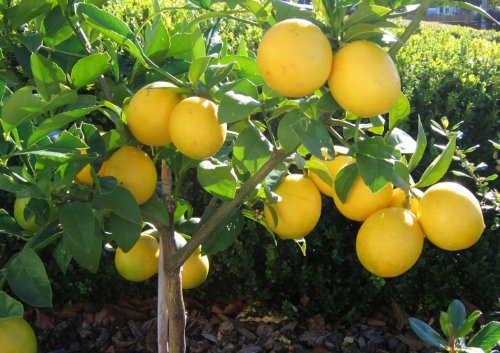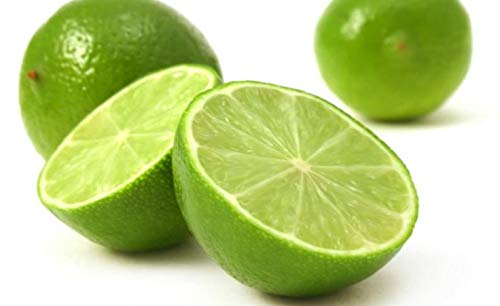

Green Paradise Offers Healthy Lemon Plant
About Lemon Plant
Lemon plants, also known as lemon trees, are evergreen trees that belong to the Rutaceae family. They are cultivated for their tart, acidic fruits, which are commonly used in cooking, beverages, and various household purposes. Lemon plants are native to Asia and are widely grown in subtropical and tropical regions around the world.
Here are some salient features and details regarding lemon plants:
Botanical Name The botanical name for the common bomb factory is Citrus limon.
Appearance:
Lemon trees are small to medium-sized evergreen trees that can reach heights of 10 to 20 feet (3 to 6 meters). They have an upright, spreading growth habit with dense foliage. The leaves are oval-shaped, glossy, and bright green. The tree may also produce fragrant white flowers.
Fruit:
The lemon fruit is oval or round in shape and has a bright yellow peel when fully ripe. The pulp inside is segmented and acidic, with a sour taste. The fruit is rich in vitamin C and is a good source of antioxidants.
Growing Conditions:
Lemon plants thrive in warm climates and prefer full sun exposure. They require well-drained soil with a pH range of 5.5 to 6.5. They are not frost-tolerant and may suffer damage or even die if exposed to freezing temperatures. Lemon plants can be grown in containers, allowing them to be moved indoors during colder months in areas with harsh winters.
Cultivation:
Lemon plants are usually propagated through grafting or by planting seeds. Grafted plants tend to produce fruit earlier and have more consistent characteristics. They bear regular watering, especially during dry ages. Pruning is important to maintain the shape of the tree and encourage proper airflow. Fertilizers may be applied during the growing season to promote healthy growth and fruit production.
Uses:
Lemons have a wide range of culinary and non-culinary uses. They are a popular ingredient in cooking and baking, adding flavor to a variety of dishes, beverages, desserts, and dressings. Lemons are also used for making lemonade, lemon tea, and various cocktails. Additionally, lemon juice is a natural cleaning agent and can be used for household cleaning purposes.
Health Benefits:
Lemons are known for their high vitamin C content, which supports immune function and acts as an antioxidant. They also contain other vitamins and minerals like potassium, calcium, and vitamin B6. Lemon juice is often used as a remedy for sore throat relief and is believed to aid digestion and promote hydration.
It's worth noting that lemon plants require patience, as they can take several years to bear fruit. However, their fresh and tangy fruits make them a rewarding addition to home gardens and orchards alike.
How To Grow Lemon Plant
Growing a lemon plant can be a rewarding experience, and it's relatively easy to do.
Here's a step-by-step guide on how to grow a lemon plant:
Select a suitable lemon variety:
Choose a lemon variety that is suitable for your climate and growing conditions. Some popular bomb kinds include Eureka, Lisbon, Meyer, and Ponderosa.
Obtain lemon seeds or a young lemon tree:
You have two options for starting a lemon plant. You can either germinate lemon seeds or purchase a young lemon tree from a nursery or garden center. Growing from seeds requires more time and patience, as lemon seeds can take several weeks to germinate.
Prepare a suitable container:
If you're growing the lemon plant in a pot, choose a container with good drainage. Ensure that it is large enough to accommodate the roots of the lemon tree as it grows. If you're planting directly in the ground, choose a well-draining location with plenty of sunlight.
Prepare the soil:
Lemon plants prefer well-draining soil with a slightly acidic pH level between 5.5 and 6.5. If your soil is heavy or compacted, consider adding organic matter like compost to improve its texture and drainage.
Planting the lemon seed or young tree:
For seeds: Plant the seeds about half an inch deep in the soil. Keep the soil constantly wettish, but not exorbitantly wet. It may take a few weeks for the seeds to germinate.
For young trees:
Dig a hole that is slightly larger and deeper than the root ball of the young tree. Place the tree in the hole, making sure it is at the same level as it was in the nursery container. Fill the hole with soil, and gently indurate it around the roots.
Watering:
Water the lemon plant regularly, keeping the soil evenly moist. Lemon trees prefer a consistent supply of water but can be sensitive to overwatering. Allow the top inch of soil to dry out slightly before soddening again.
Sun:
Lemon trees need the plenitude of the sun to thrive. Choose a sunny location for outdoor planting or place your potted lemon plant in a spot that receives at least 6-8 hours of direct sunlight per day.
Fertilization:
Lemon trees benefit from regular fertilization. Use a balanced citrus fertilizer or a slow-release fertilizer specifically formulated for citrus plants. For information on frequency and operation rates, refer to the package.
Pruning:
Prune your lemon plant to maintain its shape, remove dead or diseased branches, and promote airflow and sunlight penetration. Pruning is typically done in late winter or early spring before new growth begins.
Pests and diseases:
Monitor your lemon plant for pests like aphids, scale insects, and citrus leaf miners. If you notice any signs of pest infestation or disease, take appropriate measures such as using organic insecticidal soaps or consulting a local nursery for advice.
Patience:
Growing lemon plants from seeds or young trees requires patience. It may take several years for your lemon tree to bear fruit. In the meantime, enjoy the process of watching it grow and caring for it.
Remember that growing lemon plants can vary depending on your specific climate and conditions. It's always helpful to consult local gardening resources or seek advice from experienced gardeners in your area for tailored guidance.
Customer Reviews
Based on 1 review
Write a review
